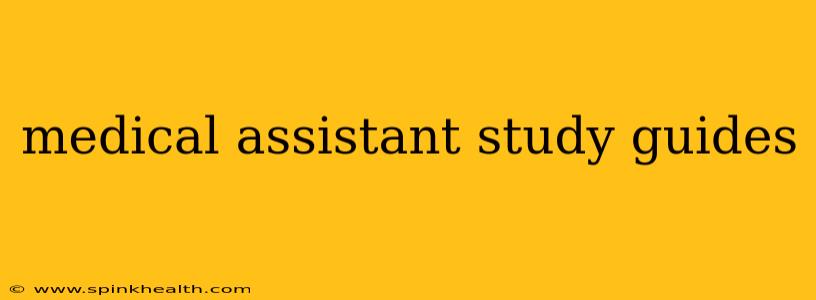So, you're embarking on the exciting journey of becoming a Medical Assistant? Congratulations! This path is filled with rewarding challenges, and mastering the material is key to success. This isn't just another study guide; it's your roadmap to conquering the exam and launching a thriving career. We'll cover everything from the basics to advanced concepts, addressing the most frequently asked questions along the way. Let's dive in!
What are the Core Subjects Covered in Medical Assistant Programs?
The curriculum for a medical assistant program is comprehensive, covering a broad range of topics. Expect to delve into administrative duties, clinical procedures, medical terminology, anatomy and physiology, and pharmacology. Each of these areas plays a vital role in a medical assistant's daily tasks. You'll learn how to handle patient intake, manage medical records (both paper and electronic), schedule appointments, and even process insurance claims – all vital administrative skills. On the clinical side, you'll be trained in vital signs measurement, electrocardiograms (ECGs), phlebotomy (drawing blood), and assisting with minor procedures. A solid understanding of anatomy and physiology is fundamental to your clinical work, while pharmacology equips you with the knowledge to safely handle and administer medications.
What Kind of Questions Will Be on the Medical Assistant Exam?
The exam's format varies depending on the certifying agency (e.g., RMA, CMA), but expect a mix of question types. Multiple-choice questions are common, testing your knowledge of medical terminology, procedures, and administrative tasks. You might also encounter scenario-based questions that require you to apply your knowledge to real-world situations in a clinic or doctor's office. The questions will assess your understanding of medical ethics, patient safety, and legal responsibilities – crucial aspects of the profession. Finally, be prepared for some fill-in-the-blank and true/false questions.
What are the Best Medical Assistant Study Strategies?
Effective studying isn't just about cramming; it's about building a solid foundation of knowledge. Start early! Don't leave studying until the last minute. Begin reviewing your course materials well in advance of the exam date. Break down your study sessions into manageable chunks. Focusing on one subject area at a time will help you retain information more effectively. Active recall is crucial. Instead of passively rereading your notes, try testing yourself regularly using flashcards or practice exams. This forces your brain to retrieve information, strengthening memory. Join study groups to discuss challenging concepts and share insights with your peers. This collaborative approach can significantly enhance understanding and highlight areas where further study is needed. Finally, utilize online resources such as practice exams and interactive tutorials to supplement your studies.
What are Some Key Topics to Focus On?
Several topics consistently appear as high-yield areas on medical assistant exams. Mastering these will significantly boost your confidence and performance. Medical Terminology: A firm grasp of medical prefixes, suffixes, and roots is essential for understanding medical records, prescriptions, and patient communication. Vital Signs: Accurately measuring and recording vital signs (temperature, pulse, respiration, blood pressure) is a fundamental skill. Phlebotomy: This involves properly collecting blood samples, a crucial aspect of laboratory testing. Electrocardiography (ECG): Learning to perform and interpret ECGs is vital for detecting heart abnormalities. Administrative Procedures: This encompasses scheduling appointments, managing patient records, insurance processing, and handling patient billing. Don't neglect these administrative duties; they form a significant portion of your role.
How Can I Find Practice Exams for Medical Assistants?
Many online resources and study guides offer practice exams designed to mimic the actual medical assistant certification exam. These practice exams are invaluable for familiarizing yourself with the format, identifying your strengths and weaknesses, and getting used to the timing of the exam. Many review books include practice tests, and some online platforms offer subscription-based access to extensive practice question banks. These resources will help you identify any knowledge gaps and refine your exam-taking strategies.
What are the Most Common Mistakes Made When Studying for the Medical Assistant Exam?
One common pitfall is procrastination. Starting early and creating a realistic study schedule is crucial. Another is passive learning – simply rereading notes without actively engaging with the material. Active recall methods, like flashcards and practice questions, are far more effective. Neglecting weaker areas is another mistake. If you struggle with a particular topic, dedicate extra time to mastering it instead of avoiding it. And finally, failing to practice time management during study sessions can hurt your performance on the actual exam. Simulate exam conditions to improve your speed and accuracy.
Becoming a Medical Assistant is a rewarding career choice. By following these study strategies and focusing on the key areas, you can confidently approach your exam and embark on your new career with success. Good luck!

